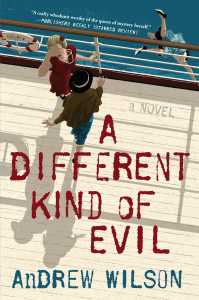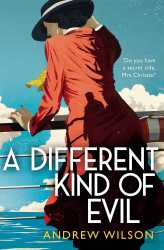Andrew Wilson’s first novel featuring Agatha Christie, A Talent for Murder (2017), met with positive reviews but seemed rather more Highsmithian than detection in concept (perhaps unsurprising, as Wilson has written a biography of Patricia Highsmith) and so I passed it over. And then John Norris — patron saint of the obscure, the forgotten, and the damned-near impossible-to-find — posted this rave review of the follow-up, A Different Kind of Evil (2018), and definitely caught my interest.
Set during a trip to Tenerife that Christie very much did make in the February of 1927, a couple of months after being found ‘with amnesia’ in Harrogate, this repurposes her motives in going to be much more than mere rest and recuperation. While her young daughter Rosalind and secretary Carlo accompany her very much under this impression, Agatha has in fact been recruited by an arm of British Intelligence to investigate a mysterious death on the island. And, of course, shenanigans ensue.
In many regards the book has a lot to recommend it, though I’d stop short of outright praise and instead suggest that it’s…fine. Wilson has a brisk and easy style (some alarmingly clunky sentences aside), and he’s clearly penning this as much in homage as a novel of crime and detection. I’d advise up front that it’s very much not in the style of Agatha Christie’s own plots — Wilson never claims that it is, so I’m not faulting him on this, I’d just like to preclude any questions around construction, clewing, or resolution from that perspective: this is far looser and less satisfactory than most of what came out with Christie’s name on it, and there’s never any suggestion that Wilson is trying to write in the Christie idiom.
Indeed, one of the things that commends it the most is how unlike Christie this is in general structure. The first six chapters find us ship-bound and will, via a suicide Agatha happens to be on hand to witness, introduce most of the characters who play any meaningful part in what is to come, and then we hit Tenerife and everyone loosely interacts for the remainder of the narrative, introducing plot threads that are dropped by the handful come the end. Christie would reverse this: starting off with a loosely-associated group who end up more and more entwined with the past deeds that come back to claim one or more of their number. Here, the shared experience of murder is very different. When people die in Wilson’s book, everyone goes “Well, how ghastly!” and simply doesn’t invite the deceased’s significant other to dinner any more.
Character-wise, we’re very much in a two-hander: Agatha herself is still reeling from the combined events of discovering her husband’s infidelity and the plot of the first novel, hinted at in enough detail here that you could probably work it out if you were so inclined. Her reflections on these dual shocks — “a nasty blood stain that could never be rubbed clean” — are among the book’s strongest passages. She dwells on the nature of trust and happiness, on her feelings and faults as a mother, and while they help communicate a reserve and humanity to this fictional Agatha which will add to the plot not one iota, they nevertheless give a compelling portrait of a woman in a real state of flux, having been deposed from a life she had previously assumed secure. Precisely how true to life this is I have no idea, but a great strength of this is that you believe it fully enough for it not to matter (seriously, remove all this and call the protagonist Hayley Johnson and you’ve got a thrilling new heroine).

These covers give a distinct “It’s set on a boat” vibe, eh?
The second character, and source of the overwhelming majority of the problems the novel faces, is Gerard Grenville, resident of Tenerife, practitioner in all manner of rumoured Dark Arts, and — I’d apologise, but we’re all adults here and have read a few of this type of book — the reddest herring who ever herringed. The novel is so reliant on Grenville to be the source of just about everything it requires, the absolute failure of it to convince you of his guilt in any way, shape, or form leaves a gigantic hole in the middle of the narrative that it’s unfortunately impossible to even edge around. Nothing about Grenville works, and Wilson probably started to suspect this himself, because literally every single thread concerning him is not so much dropped as…I don’t even know what the correct verb would be. Imagine spilling a while bottle of milk over the floor, and then failing to acknowledge it, so that it steadily curdles and stinks the place up. It goes through that sickly-sweet ‘on the turn’ phase, into the flat mould phase, and through the eye-watering era of fetid and foul fumes clogging your nose and ears and mouth no matter in what corner of the house or garden you choose to hide. But never at any point do you or anyone who comes to visit mention the words “milk”, “floor”, “smell” or “clean up”. That’s what happens here with Grenville.
How does he know what Agatha is thinking when they first meet? What’s the significance of the tarot cards she draws in his presence, and how honest is he about which card it was anyway? Does he really believe she has psychic powers, or is that some sort of chicanery? What’s with the Bond villain-level obsession with poisonous plants? At the three-quarter mark, when his true nature is revealed, why in the hell does the other person involved then behave absolutely as if nothing is amiss, despite telling Agatha to perform actions which lead to the discovery? Precisely what were his intentions the morning after Agatha stays over at his house, when Carlo comes to Agatha’s rescue? And why, given how weirdly Agatha behaved — the contents of that drinking glass, for one thing — does Grenville give no indication that anything in her behaviour struck him as unusual? All these question and more will remain thoroughly unaddressed, as if the book never asked them in the first place. Because there’s a murder to solve, so let’s rush onto that…!
Er, yes. About that. The book gives so much time to ancillary matter — I’ll get to those in a minute — that the solution to the murder is…I don’t want to say ‘laughable’, but I did laugh. And not in a happy way. Not least because in summing it up, and linking together the maybe three or four clues there are to connect it all together, Agatha jumps in feet-first with an assertion that there is absolutely no justification behind…and is of course completely on the money. And then the guilty parties start freaking out and monologuing and betraying each other and it’s just awful and waaaaay too complex and waaaaay too minor to justify such an elaborate and staggeringly under-thought series of actions. The action, shall we say, undertaken by Agatha to start of this denouement is one of the few moments of invention in the entire book, but the way it plays out even manages to undo that…though I retain a huge admiration for what Wilson almost had me believing. And the solution he wants you to swallow at the end of all this is very simply not the dish he has put in the preparation to cook.
I see — I really do — that it is in many ways a reference to an aspect of Christie’s own works that would become, let’s say, more and more refined and sly and brilliantly used as her writing developed up to the mid-1950s, but the book does not function on that level of metacognition that allows you to crowbar in a key plot point this hard purely so that it can be said to have had enough impact on the young novelist to the extent that it would become an all-consuming fascination that she’d then spend 30 years trying to come to terms with through her fiction. At one point, Agatha is asked a polite question about the kinds of trees she climbed as a child, and reflects that the asker “didn’t give a fig for the answer” and there’s no way that’s meant to be a joke. That’s the level we’re typically operating at here, which is a roundabout way of saying that the plotting is bad. Very bad.
Wow, I am going on.

“Yeah, you are a bit, to be honest.”

That doesn’t sound at all bad. I’m always open to hearing about new fiction that might be of interest but it can be difficult to sort through it all and work out what may be worthwhile.
LikeLike
No, it’s absolutely fine, as I say. Difficult to get too excited about, but perfectly passable as someone new to the genre trying to work in elements of the milieu that echo the type of book being written in the era this recalls. Hell, it’s a meta enough job in that regard alone, hence my hopes of an improvement next time around — I’d hoover up something like this done with a little more editorial control, and would more than happily read one a year for the next brace of decades.
Here’s hoping…!
LikeLike
1. I read John’s review.
2. I checked the book out of the library.
3. I let it sit on my bedside table for two and a half weeks. Occasionally, I glanced at the cover with a faint moue of distaste.
4. I read the first page.
5. I returned the book to the library.
At no time during this process did I nauseate my fans with discussions of curdled milk! Some of us read you at breakfast, chum!
LikeLike
I’m reasonably confident this wouldn’t have been your cup of chai, Brad, so it’s perhaps for the best. I’ll definitely check out the next one — always nice to have a book to look forward to — and with any luck Wilson will improve his clues and tighten his plots and it’ll provide more fun for the discerning detective reader. Find out in, like, twelve months from now…
LikeLike
What the smeg?
😈
LikeLike
🤣
LikeLike
Wilson’s Highsmith bio is amazing, but for me it’s hard to read fiction about real people, no matter how well-written. I always have a mental image of how that person would be in real life and tend to rather unfairly judge authors for deviating from it.
In other news, the real crime is the murder of my dinner by that spoiled-milk analogy. Thanks?
LikeLike
That’s two of you put off by me mentioning spoiled milk. What the hell? Are my narrative powers that refined? Should I be selling this stuff?
LikeLike
We’re just overcome by the vivid quality of your prose. You could have a great future writing food-safety manuals.
LikeLike
Just for information, there is an another series featuring Christie as sleuth by Alison Joseph. Only read the one, but it did a reasonable job of emulating Christie’s style, iirc. Been meaning to read another one of those for a while,,,
LikeLike
Good to know, thanks. Though I’d be surprised if this was the only other one…!
LikeLike
This one just has a better publicist… here’s my not very informative review from days past. https://classicmystery.blog/2015/07/07/murder-will-out-by-alison-joseph/
LikeLike
Yes, I think I’m with you on this one – not just the inconsideration of crunching cookies over the novel, but also the puzzle for the novel. I think I would still try out more entries into this series, but this one left me slightly lukewarm.
I’m looking forward to hearing your take on Penny’s novel! 🤩🤩 “Armour” was certainly one of the strongest mysteries I’ve read thus far this year.
LikeLike
I think he’s done a good job setting-wise, but considering his genre of choice this definitely needed a bit more plot. We’ll see: I’m not discouraged, but I would have liked to like this more.
As for SHtHG…well, not long to wait now!
LikeLike